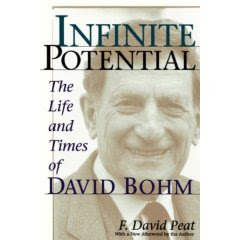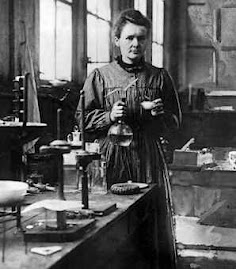 Time to get back to the Gladwell Affair. He seems to have appropriated my previously published metaphor for intuition ‘a blink of the eye’ in Blink, and the book turned into a best seller. Check out Things Are Not As They Seem
Time to get back to the Gladwell Affair. He seems to have appropriated my previously published metaphor for intuition ‘a blink of the eye’ in Blink, and the book turned into a best seller. Check out Things Are Not As They SeemI first published the metaphor along with the unusual experience in which it came to me in 1997 in a journal article in Perspectives in Biology and Medicine titled “Towards an Understanding of Intuition and its Importance in Scientific Endeavor." (See link to paper at end; the metaphor etc. is on page 4.) The metaphor may sound obvious, but like most powerful metaphors, this is only true once you have heard it. It is also at the core of a book I have written over a period of ten years that explores the science and experience of intuition.
Here are the facts. Early in 2002, at the suggestion of a former colleague, I wrote to Tina Bennett a literary agent in New York and asked her to represent my book on intuition. In my letter I included the citation to the paper I had published on the topic---to show I was qualified to write the book. She turned me down.
In early 2005, Malcolm Gladwell her client published Blink and did not cite my paper. The title is a clear reference to the metaphor, however this is legitimate in terms of copyright law since titles are open game. He crosses the line when he uses the metaphor as a synonym for intuition in the introduction (page 17) and said " ...there can be as much value in the blink of an eye as in months of analysis." The line is frequently quoted.
After Blink came out, I wrote to Gladwell, Tina Bennett, the agent, and Michael Pietsch, the head of Little Brown, the publisher of the book, asking them to cite my first use of the metaphor. They declined; a lawyer informed me that both Gladwell and the agent claimed they had not seen my paper.
It would be more comfortable for me in several ways if I could believe that my work was not the source of this metaphor, which had an important part in making Gladwell book a bestseller. But, alas, this comfort was not to be.
Early on, when I was in the midst of trying to convince myself my work was not their source for the metaphor, I had one of the most unusual spiritual intuitions I have ever had. Time slowed down, and soft, other-worldly inner light illuminated the stunning message that they had indeed taken the metaphor from my work.
I find the ordinary or clearly biologically-based aspects of intuition much more arresting than its potential extraordinary aspects at this point in my life. But because of the completely unbidden, even “contrary” nature of this experience---along with its strong spiritual surround, it intrigues me. (The connection between intuition and spirituality does interest me strongly.) Most of the time, I believe what it reported is true. At the very least, I cannot just ignore its uncomfortable message.
I have decided not to sue for copyright violation---at least for the time being.
 Eventually should I decide to do so, I sense there is a very interesting case to be made. For anyone who might be holding their breath, rest assured it does not depend on extraordinary knowing, but rather on the copyright law and the nature of metaphor. In fact whether or not Gladwell initially saw the paper is immaterial to the copyright issue. I informed of them my prior use of the metaphor, and they declined to cite it.
Eventually should I decide to do so, I sense there is a very interesting case to be made. For anyone who might be holding their breath, rest assured it does not depend on extraordinary knowing, but rather on the copyright law and the nature of metaphor. In fact whether or not Gladwell initially saw the paper is immaterial to the copyright issue. I informed of them my prior use of the metaphor, and they declined to cite it.My unwitting connection with Malcolm Gladwell has made my book on intuition, which is a difficult book to publish, even more so. I sense publishers are uncomfortable with the fact that I actually first published this metaphor, which has cemented Gladwell’s role as the king of the publishing world. Alas this emperor---who claims he wants "to make a better world"---may be only scantily clad.
My book is inherently difficult to publish because it includes both scientific material about intuition and intuitions about intuition. (These intuitions, like my blink of the eye experience, are very powerful and rather extraordinary in their own way, but they do not require extraordinary intuition to account for them.) I was surprised and delighted to find
 these two different approaches bootstrapping on each other to reveal so much more about intuition than I would have ever imagined possible. Over time, the book turned into a bridge between our two ways of knowing.
these two different approaches bootstrapping on each other to reveal so much more about intuition than I would have ever imagined possible. Over time, the book turned into a bridge between our two ways of knowing. What some might see as a risky partnership in which vast culture differences spell failure, I know to be an alchemical marriage in which both sides are transformed. Sometimes having to hang out with material that is alien to one's ordinary way of thinking and seems unclear has much bigger impact than information effortlessly absorbed. This kind of hard won impact is what is needed for the transformation I am hoping to have a part in bringing about. I am also convinced that there is a large audience for the book. Most people who have more than a passing acquaintance with this material have been deeply affected by it. We are all at some level longing for the sense of wholeness that this joining promotes.
I wish that this difficult experience had not happened. But it has had a silver lining. It has forced me to retink what is really important in living. Certainly I want a sense of completion for my long project, recognition for my work, and to share what I have found with others. But I have learned that many apparently lesser things are perhaps even more important to me---most especially the simple joy of being.
When Blink first came out, I asked myself half jokingly, “ If I had to choose between enlightenment and getting my book published, which would it be?” Had I responded from the place where I usually lived then, I would have answered that getting my book published was more important.
I am in no danger of getting enlightened any time soon, but something has
 started to switch. I sense that certain essential oils with spiritual overtones are concentrating and growing stronger in me---as sometimes happens to herbs grown in poor soil. My wish is more and more for wisdom in my efforts to serve. I sometimes still worry about the book getting published, but for the most part I know that it will happen when the time in right
started to switch. I sense that certain essential oils with spiritual overtones are concentrating and growing stronger in me---as sometimes happens to herbs grown in poor soil. My wish is more and more for wisdom in my efforts to serve. I sometimes still worry about the book getting published, but for the most part I know that it will happen when the time in rightMy 1997 paper on intuition has not been readily available on the web. I have decided to make it so and eventually some of my other work on intuition. Anyone tempted to use my work without attribution--or any other work--beware of the risk! Alas this risk is so easy to overlook in the rush to get ahead---and ahead---and even further ahead. Though intangible, I suspect it is substantial---at least for those who care about an open relationship with their soul.














6 comments:
★Lois Isenman You are on the big news!!…
Hi Lois,
If I can, I'm going to copy to you a comment I sent on a reading for another group. I think it is relevant to your Gladwell problem.
"This essay also addresses a problem some of us have discussed, namely the dilemma of men's appropriation of women's ideas without acknowledging their origin. Sometimes I think this is unconscious, but it hardly matters. The dilemma is:
1) Should we celebrate that they "get it" at all, and work more or less in concert but without recognition to realize the end, even where imperfectly understood. This can be self-defeating,or
2)Struggle for recognition at the risk that attribution will provide vindication, but undercut alliance and maybe distract attention from the original object."
Hilde
Hilde,
You really hit the nail on the head. Time and time again I have to consciously frame this as "the problem" the Gladwel problem has become. This allows me to legitimize not knowing the answer and holding it as an open and dynamic question for which there is no right answer. (Without this my superego tends to identify one alternative as "good" and the other as "bad.") This also helps put the periodic swings from one side to the other in perspective.
Lois
You don't have a Gladwell problem--he arrived at the same figure speech that many others would when characterizing this field. The problem is not publishing your book after 10 years. A decade gives others plenty of time to hatch the the same expressions and findings that are contained in your ms.
Epicuria,
As a writer who deals with academic material, Gladwell is bound by the same conventions that bind academics. We are required to cite prior use of the ideas we write about. Also we are responsible for knowing the literature in the field. If we miss something, and it is pointed out to us, we are required to make amends as soon as we can. There is wisdom to this. Powerful ideas and powerful metaphors have a way of framing the way people think and speak of things. They are very easy to pick up second or third hand and to assimilate as one’s own
I do believe that Gladwell did see my paper. It could have been through the agent. Alternatively it could have been through a person who Gladwell writes about in his book---an expert on intuition--- who helped orient Gladwell to the literature, and who I had exchanged papers with previously. When I queried this person, he said he couldn’t remember whether he sent the paper to Gladwell.
Yes the metaphor sounds obvious once you hear it--- but coming up with metaphors of this depth require completely turning off the conscious mind ---something few of us do. In the experience in which it came to me, (pg 4 of my paper), I turned off my conscious mind because I couldn’t answer the question, “What is intuition?” asked by my friend very early in my exploration of intuition. If Gladwell had completely turned off his conscious mind---he may well have come up with an equally deep metaphor---but a different one. Some prior evidence is consistent with the idea that Gladwell borrows his powerful metaphoric framing from others. Thus “the tipping point” was not original to Gladwell, rather popularized by him. The man is all about borrowing and popularizing.
You say the problem was that I took 10 years to write my book. A wise editor once said that really important books take 5 to 13 years to write. This means of course really important books--- whether my book falls in this category I do not know---it just might.
Finally, do I have a Gladwell problem? In the eyes of some agents and publishers I certainly do. For example, I wrote to one agent using the metaphor in the title. She wrote back immediately saying she wanted to see a writing sample. But apparently she thought I was merely getting on the Gladwell bandwagon--- cashing in on a hot trend. When she realized that I had first published the metaphor--- she said she wasn’t interested because of Gladwell’s book and was concerned that maybe I didn’t know about it.
Eventually the book will get published, and in the meanwhile I have learned a lot. I would not have chosen this experience, but I have put it to good use. Perhaps the issue has is not taking too long to write the book, but quite to the contrary, waiting for the world to be ready for the book.
I do not know if you are male. However I have noticed that certain men (who may have a hard time dealing with feelings---and perhaps especially feelings of victimization) have gotten a little freaked out by this situation. Instead of an empathetic or a neutral response, they have shot back at me and tried to blame me for it.
Lois
Hi Lois,
I'm a male, 51, engineer/entrepreneur. Generally people value my judgment and problem solving skills as well as my ideas. As for me, I've come to appreciate the big part played by my intuition.
However, since childhood I noticed that some people more than others were appropriating my ideas and taking exclusive credit for them.
I became so used to this, that at work I would sometimes bring up an idea with a co-worker, intentionally "marking" it with a flaw. When the appropriator presented the idea to a broader meeting as his own, I would point out the flaw. The reaction was usually a hard, resentful but also terrified look in my direction.
With reference to an earlier comment, one woman I dated for ~10 years would also routinely appropriate (non work-related) ideas in the same fashion, and this led me to the conclusion that gender probably isn't a factor.
As you point out, it has much to do with a person's lack of familiarity with, or connectedness to her/his feelings.
Having said that, thanks to (or in spite of) the many frustrations, feelings of injustice etc., I now feel that all this was instrumental in fostering my spiritual growth, and that's a very nice exchange, against vanity and glory.
But I also agree that you should ponder some form of legal action against Gladwell.
Who knows, maybe he still can learn the rules of the game: one, plagiarism is BAD!
Mario
PS interesting and elegant blog!
Post a Comment